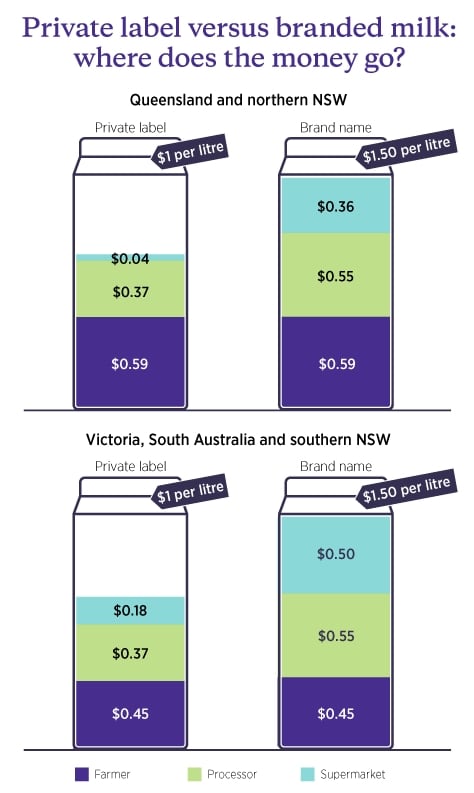And while the ACCC said that A$1 (US$0.76) a liter private label milk wasn’t to blame for farmers’ woes, the Queensland Dairyfarmers’ Organisation (QDO) says it’s part of the problem.
Shifting risk to farmers
The ACCC said its analysis suggests a code is warranted to address bargaining power imbalances between processors and farmers, improve price and production signals, stop practices that transfer risk inappropriately, and enhance competition for farmers’ milk.
ACCC commissioner Mick Keogh said it was clear that processors, often under pressure from supermarkets or export market competition, use their relative bargaining power to shift risks onto dairy farmers.
“The power imbalance is evident in the nature of contracts between the processors and farmers. These involve uncertain pricing information and contract terms which deter switching,” Keogh said.
“A code would strengthen dairy farmers’ weak bargaining position and therefore improve competition at the farm gate.”
Many processors have supported a recent voluntary code, however, the ACCC said while this has improved contract terms in milk supply agreements, it doesn’t go far enough.
“It is unlikely to fully address the issues that cause detriment in the industry in the longer term. The voluntary code is not enforceable and processors can choose to not participate or not comply, and there are no negative consequences,” Keogh said.
$1 a liter milk not the issue
The ACCC also analyzed the impact of A$1 per liter private label milk on earnings through the dairy supply chain.

According to the ACCC, the decision by supermarkets to sell private label milk for $1 per liter is a source of annoyance for many dairy farmers, who believe it denigrates the effort they put into producing milk.
However, the ACCC found that farmers earn the same regardless of whether their milk ends up as private label, or more expensive branded milk.
“Farm gate prices are quarantined from other costs which affect the prices paid by supermarkets and the margins earned by processors.
“We don’t think that an increase in the retail price of private label milk would necessarily benefit farmers, and that any additional profit would mainly be captured by the major supermarkets and processors,” Keogh said.
Benefits go to consumers
The ACCC found major supermarkets have leveraged their buying power to lower wholesale processing costs and capture profits from processors. While the supermarkets have kept some of the resulting profits, they have mostly transferred the benefits of these wholesale cost savings to consumers.
Strengthening the bargaining power of farmers, and limiting the extent to which processors can simply transfer risk onto them, appears the best way to address bargaining power imbalances, the ACCC said.
QDO unimpressed with report
However, the QDO said the ACCC’s report would do nothing to address issues affecting the Queensland dairy industry.
QDO president Brian Tessmann slammed the report, which he said lacked direction and intent to deliver what is was established to do – “to fix the mess threatening our dairy farmers members interests.”
He added while the report acknowledges issues affecting the industry, it offers nothing in the way of solutions or recommendations to fix it.
“QDO welcome the recommendation for a mandatory Dairy Code of Conduct, however this will not directly address the biggest issue in Queensland, the impact retail prices are having on farm gate earnings,” Tessmann said.
“It is clear that the original intent of the report has been lost on the ACCC with the interim report failing to address the systemic market failures crippling the viability of the Queensland dairy industry.
“Over a year of apparent ‘listening’ to dairy farmers and the best the ACCC can offer is toothless recommendations that simply rearrange the deck chairs without addressing the crux of the issue, the blatant market failure stemming from the supermarket duopoly.”
He said since the major supermarkets introduced $1 milk in 2011, more than A$200m (US$151m) a year has been stripped out of the Queensland dairy supply chain, resulting in more than 180 dairy farmers leaving the industry.
